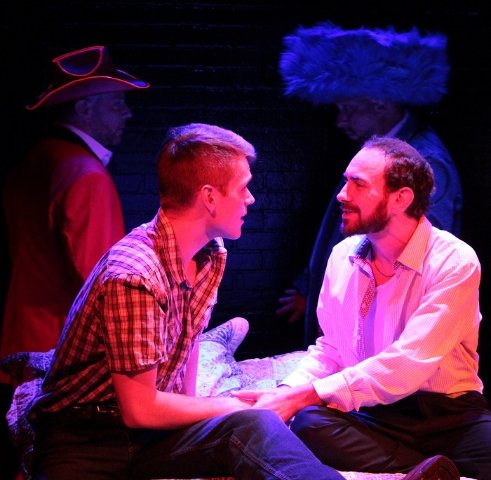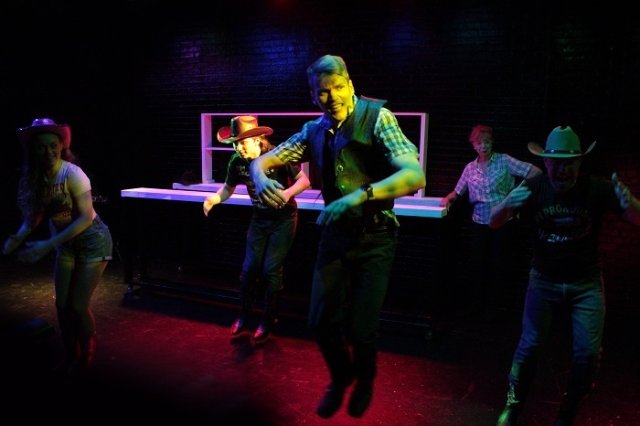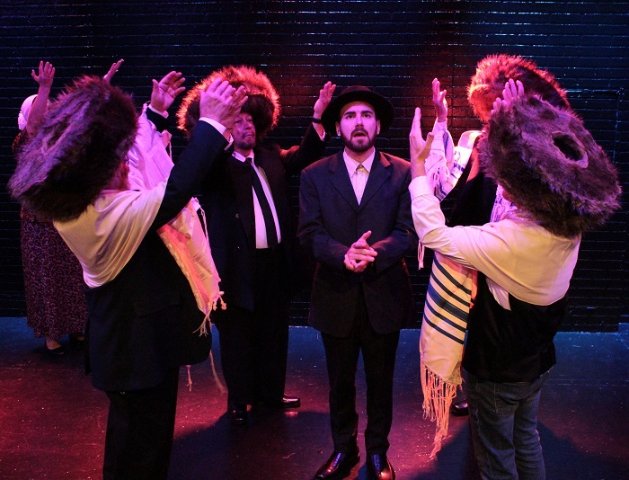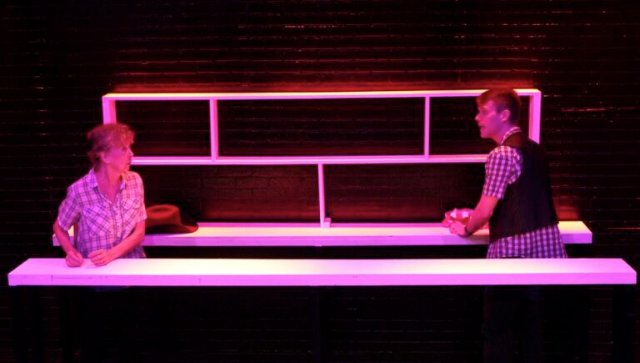A Shonda in South Florida
World Premiere at The Foundry
By: Aaron Krause - Aug 10, 2024
The term “collision” usually carries a negative connotation. After all, serious injuries or worse can result when people or vehicles collide.
But a potentially healing collision occurs in the moving, humorous, and invigorating new musical, A Shonda. It’s a clash that can hopefully, in the long run, begin to heal long festering ills such as prejudice, division, ignorance, and hatred.
Unfortunately, we are all too familiar with such problems in 2024 America. How fortunate we are, then, that the world premiere production of A Shonda is taking place practically in our backyard. More specifically, the musical, based on a play with the same title by multi award-winning playwright Wendy Graf, is making its stage debut through Sept. 1 in a touching and believable world premiere production. The producer is the nonprofit, professional company Plays of Wilton (POW) in Wilton Manors, near Ft. Lauderdale.
A tough ticket to obtain
Actually, POW’s production of A Shonda is one of the most coveted tickets in South Florida theater these days. In fact, people are returning multiple times to re-experience the show. Due to popular demand and sold-out shows, POW has extended the production by several performances. That’s a good thing because, while tickets are tough to obtain, it would be a shame to miss this show.
The cast members, who are true triple threats, deliver dynamic and convincing performances. And POW artistic director Ronnie Larsen’s sensitive direction brings out the conflict, pathos, humor, bleakness, and light in the script. Also, the behind-the-scenes artists do their part to bring the piece to believable, vivid life.
Larsen and Graf co-wrote the libretto, while Dennis Manning and Bobby Peaco composed the music and lyrics. Basically, it’s the same team that brought you past POW hits such as Now and Then, Come Out! Come Out! and One More Yesterday.
Speaking of the word “shame,” it’s a loose English translation for the Yiddish word “Shonda.” It is “a person, thing, or act that brings shame or scandal; a disgrace,” according to a definition appearing on what resembles an open Torah scroll hanging from the ceiling onstage before the 90-minute, intermission-less show starts. The production takes place in the intimate black box theater known as The Foundry. It is POW’s home theatrical space.
Forbidden relationship
In A Shonda, set in modern-day Memphis, Tenn. (and the past, through flashbacks) the ultra-Orthodox (Hasidic) Jewish community considers it a Shonda that one of their own, Duvid, is in love with a Southern Baptist, cowboy-like character named Clay.
Clay and Duvid hail from vastly different backgrounds. Ordinarily, you would expect such different individuals to go to their graves never knowing that the other existed. But in this case, they’ve known each other since they were children.
First, they became friends…then best friends…then more than that. Indeed, while these characters are dissimilar, they share commonalities. An obvious one is that they’re both gay. But, in addition, both are part of communities that discourage or even forbid same sex relationships. Adding even more fuel to the fire is the fact that Duvid is married to the rabbi’s daughter, Rachel (a devoted Ana Marie Calise); it was an arranged marriage dating from Duvid’s childhood. So, on top of the forbidden gay relationship, Duvid is cheating on Rachel.
The bond between Clay and Duvid causes the communities to confront each other. But while they may act bitterly toward one another, you get the feeling that ultimately, people from both sides will walk away with more empathy, knowledge, and sensitivity. Often, we must acknowledge and deal with our differences and problems head on to begin the healing process.
Eerily similar to today
A Shonda hardly sugarcoats the fact that we live in a divisive time during which people spew hatred. Listen, for example, to Dottie, Clay’s bigoted mother. “I thought you two were done,” she tells Duvid and her son. “At least I was hoping you were. I thought they sent him (Duvid) to Israel to put an end to these shenanigans. You know I’m not okay with this whole gay thing, but even if I were, I wouldn’t want a Jew for a son-in-law.”
Amanda, (a fun-loving Ana Marie Calise) a young woman whom Duvid knows, responds: “Dottie, come on.”
“Well, would you marry a Jew, Amanda?” Dottie shoots back. “I know you got low standards. But that’s low even for you.”
Ouch. Certainly, it stings to hear such words, especially today.
Dottie makes similar hateful remarks elsewhere in the piece. For example, at one point, during a flashback, she calls Duvid as a child a “Jew boy.” While hearing such hateful speech, it’s easy to shudder considering that such spiteful comments are common these days. Of course, the hope is that after hearing such spiteful remarks, you feel moved to take action. And that might involve approaching the Dotties of the world to encourage more open-mindedness.
Certainly, Dottie doesn’t sound like someone you’d want to approach. But, to her credit, respected and award-winning veteran South Florida performer Angie Radosh doesn’t portray Dottie as a total b-ch. You don’t automatically hate her. Sure, Radosh imbues Dottie with a bitter demeanor and an off-putting adamancy. But you also sense in Radosh’s Dottie a woman with vulnerability, as well as the capacity to love and feel regretful after acting in a hateful manner. Indeed, you sense that during this woman’s upbringing, those who raised her instilled in her regrettable qualities. They are as much a part of her as her limbs and organs.
Parents pass down traits to their children, as some of the show’s lyrics indicate.
Fathers and sons, just like mothers and daughters, they do what they’ve seen, they live what they learn, they pass down regrets, and they pass along dreams, repeat their mistakes.
Strong symbolism
The show’s score features a mix of Jewish-style music and country western style songs. While most of the songs are original, others are pre-existing, traditional Jewish prayers. The score also includes a vivid metaphor for the circular life cycle.
And it goes
Like it goes
Like a merry-go-round
Do you get off
Or stay on
In this
Hometown
The above passage features a lively, catchy melody that will likely stick in your head. And in keeping with the idea of life as a continuous circle, Oren Korenblum’s choreography smartly includes spins and performers dancing or moving in a circle. In fact, some of the choreography will likely remind you of the dancing in shows such as Fiddler on the Roof and Ragtime.
These nimble performers generally possess strong, clear singing voices, and demonstrate deft vocal control. Peaco and Manning provide solid live accompaniment on the piano and guitar, respectively, without drowning the performers out. With that said, though, it wouldn’t hurt if the performers wore microphones, even within the Foundry’s intimate space. Sometimes they have a tendency to speak and sing quietly, most likely to create portrayals as naturally as possible. As a result, though, it is sometimes difficult to make out what they are saying or singing.
Fortunately, we can make out key words and phrases, such as in the song “Water and Fire.” The song’s title clearly illustrates how different Duvid and Clay are. Just as water and fire don’t exist well together, you would think neither would these gentlemen.
Music captures mood
While the melodies generally aren’t particularly memorable, they appropriately convey moods. For example, the song “A Woman Knows” carries a fittingly somber melody. In the song, the characters sing that Rachel probably knows that her husband is cheating on her.
Meanwhile, “What’s A Little Shonda” carries a melody that is taunting and playful. It takes place in a nightmare Duvid is having featuring devilish characters. The masks that the performers wear in the number enhance the musical’s theatricality and offer well timed comic relief.
An inspiring and inclusive message suffuses the song “Can’t Take God Away.” The number gently reminds us of holiness all around us.
While some songs are in Hebrew without subtitles, it's mostly easy to follow and understand the show. And the joy emanating from the stage is palpable.
Strong acting
Generally, it is easy to pull for these imperfect but likable characters. However, the fact that those in Duvid’s community do not forgive him can leave a sour taste in our mouth.
The Hasidic rabbi leading the community is obviously a pious individual. But he can come across as intolerant as the other Hasidic characters who turn away from Duvid. Still, the rabbi becomes a more sympathetic character toward the end. “Duvidel, remember,” he tells Young Duvid in a flashback. “Hashem is love and he will always be inside you. And one day you will be married, and it will be the happiest day in your life.”
Highly respected, renowned, and award-winning performer Avi Hoffman properly portrays the rabbi with gravitas. With a grey mustache and beard, glasses, clad in black clothing, and with his eyes closed, Hoffman’s rabbi lovingly and reverently sings. But Hoffman’s rabbi is also loving to Young Duvid.
Child actor Kaden Pesaturo believably imbues Young Duvid with reverence and a peaceful aura, suggesting that the lad is comfortable with his secluded yet holy lifestyle.
As the grown-up Duvid, Brandon Campell lends his character an appropriate intensity and conviction. And, as Campbell portrays him, you believe that he loves Clay, and vice versa.
Clearly, as Jackson Goad portrays him, Clay is the calmer of the two and soothes Campbell’s sometimes nervous Duvid. Goad shines as Clay. He nails the character’s charm and laid-back aura, as well as the man’s more defiant and determined disposition. Also, menace oozes from him when Clay is angry. To his credit, Goad makes transitions between feelings seamless.
As Young Clay, child performer Jackson Goddard endows his character with a positive, upbeat, reassuring aura. During one heart-melting scene, Young Clay comforts a concerned Young Duvid.
As a pair, Pesaturo and Goddard are convincing as best friends and deliver impressively authentic portrayals.
The production will go on a hiatus after the Sunday, Aug. 11 performance and re-open on Aug. 23. It will then run through Sept. 1. However, the two lead actors and Hoffman will not appear in the show after the break.
Show isn’t perfect
While A Shonda is generally a solid live theater piece, it’s not flawless. For example, it’s quite a stretch to believe that Duvid would enter the barbecue restaurant where Clay works and order non-kosher baby back ribs, even in jest.
Also, this show lacks character depth. As an example, while we learn about Clay’s job, we never find out what Duvid does for a living. Clearly, with himself and a wife to support, he must earn money somehow. And giving Duvid a job would flesh out his character, perhaps making him more sympathetic. And what about Duvid’s family? Who are they and did they accept and love him when he came out as gay? Speaking of coming out, when did that happen for Duvid? What was it like?
When it comes to Clay, did he ever have a father figure in his life? If so, what happened to that man?
A Shonda is 90-minutes long, which is short for a musical. There is room for depth.
Behind the scenes artists shine
The cast performs on a black stage that is mostly bare when the show starts (the set designer is Melqui Dominguez). The empty stage is like a dark blank canvass with endless possibilities. Set pieces such as a bed and a bar’s liquor counter seamlessly enter the stage to fill that blank canvas.
The set pieces are lighter than the black stage and dark wall. This might suggest that in a dark world, we need to add light.
One of the settings is disquieting, but unfortunately reflective of the divisive world in which we live. Specifically, an American flag and a Confederate flag adorn the backdrop to a bar.
Nicole Alcaro designed the costumes. They reveal information about the characters and distinguish one from another. The Hasidic men, for instance, properly wear black clothing, side curls (payot or payos in Hebrew), fringes, and hats that look like they are made of fur. This outfit suggests the characters’ solemnity, but the dark color could also symbolize their intolerance.
By the end of the show, for Duvid and Clay’s wedding, the characters attending sport white outfits adorned with rainbows, perhaps suggesting light, tolerance, and open-mindedness.
Preston Bircher’s lighting design properly features a rainbow of colors symbolizing diversity and tolerance. During somber scenes, Bircher dimly lights the stage, which is a smart choice.
Realistic sound effects suggesting everything from chirping birds to thunder resound (the sound designer is Panos Mitos). As a matter of fact, in the first scene, we hear chirping birds and thunder. This might symbolize tension between conflict and peace, darkness and light. That tension is present throughout the production.
Remaining in the dark
While A Shonda reveals the ugly side of human existence (conflict, bitterness, intolerance, division), the show is ultimately hopeful, positive and leaves us with an encouraging message that should unite all. Specifically, that message is love is love and one can find holiness everywhere. At its heart, the show is about the power of true love and people's ability to transcend differences and unite to celebrate our shared humanity.
It’s just a shame that the last time we see the show’s Hasidic characters, they turn away from Duvid without uttering a word after he seeks their forgiveness. At least forgive or acknowledge him; no one’s asking them to attend Clay’s and Duvid’s wedding.
A Shonda may transition from darkness to light, but the Hasidic characters, unfortunately, remain in the dark. At least in Fiddler on the Roof, Tevye bent as far as he could before breaking.
IF YOU GO
WHAT: Plays of Wilton’s world premiere production of the musical adaptation of “A Shonda”
WHEN: The production will go on a hiatus after the Sunday, Aug. 11 performance and re-open on Aug. 23. It will then run through Sept. 1.
WHERE: The Foundry, 2306 Dixie Highway in Wilton Manors.
TICKETS: For ticket prices and more information, visit www.ronnielarsen.com.




